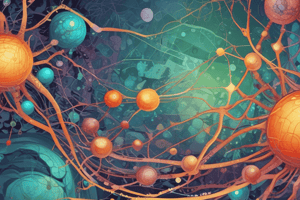Podcast
Questions and Answers
What type of signaling occurs when cytokines bind to receptors on the same cell that secreted them?
What type of signaling occurs when cytokines bind to receptors on the same cell that secreted them?
- Autocrine signaling (correct)
- Exocrine signaling
- Endocrine signaling
- Paracrine signaling
What is the mode of cytokine action when they affect cells in the surrounding tissue?
What is the mode of cytokine action when they affect cells in the surrounding tissue?
- Autocrine signaling
- Paracrine signaling (correct)
- Intracellular signaling
- Hormonal signaling
When cytokines enter the bloodstream and influence distant cells, this is referred to as what type of signaling?
When cytokines enter the bloodstream and influence distant cells, this is referred to as what type of signaling?
- Endocrine signaling (correct)
- Autocrine signaling
- Neural signaling
- Paracrine signaling
Which of the following describes the role of cytokines in endocrine signaling?
Which of the following describes the role of cytokines in endocrine signaling?
Which process does NOT describe how cytokines can influence other cells?
Which process does NOT describe how cytokines can influence other cells?
Cytokines that affect the same cell from which they are secreted are signaling in a paracrine manner.
Cytokines that affect the same cell from which they are secreted are signaling in a paracrine manner.
Paracrine signals influence cells located within the same tissue region as their source.
Paracrine signals influence cells located within the same tissue region as their source.
Cytokines behave as hormones when they diffuse into the bloodstream and affect distant cells.
Cytokines behave as hormones when they diffuse into the bloodstream and affect distant cells.
Endocrine signaling involves cytokines acting locally on a limited number of cells.
Endocrine signaling involves cytokines acting locally on a limited number of cells.
Cytokines can only signal in an autocrine or paracrine manner, but not in an endocrine manner.
Cytokines can only signal in an autocrine or paracrine manner, but not in an endocrine manner.
Flashcards are hidden until you start studying
Study Notes
Cytokine Signaling Mechanisms
- Autocrine signaling: Cytokines bind to receptors on the same cell that secreted them, leading to self-regulation and amplification of the cell's responses.
- Paracrine signaling: Cytokines act on nearby cells within the same tissue, facilitating communication and coordination among cells in a localized area.
- Endocrine signaling: Some cytokines enter the bloodstream, allowing them to act as hormones that influence distant target cells throughout the body.
- The context of these signaling methods is critical for understanding cellular communication and immune responses.
Cytokine Signaling Mechanisms
- Autocrine signaling: Cytokines bind to receptors on the same cell that secreted them, leading to self-regulation and amplification of the cell's responses.
- Paracrine signaling: Cytokines act on nearby cells within the same tissue, facilitating communication and coordination among cells in a localized area.
- Endocrine signaling: Some cytokines enter the bloodstream, allowing them to act as hormones that influence distant target cells throughout the body.
- The context of these signaling methods is critical for understanding cellular communication and immune responses.
Studying That Suits You
Use AI to generate personalized quizzes and flashcards to suit your learning preferences.




